|
|
|
Sort Order |
|
|
|
Items / Page
|
|
|
|
|
|
|
| Srl | Item |
| 1 |
ID:
128533
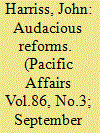

|
|
|
|
|
| Publication |
2013.
|
| Summary/Abstract |
An introduction is presented to a section of articles on the topic of India's social policies in which the author discusses the country's welfare legislation and their Land Acquisition, Rehabilitation and Resettiement Bill (LARRB).
|
|
|
|
|
|
|
|
|
|
|
|
|
|
|
|
| 2 |
ID:
128529


|
|
|
|
|
| Publication |
2013.
|
| Summary/Abstract |
Although the pluralist system of land tenure in Vanuatu does not directly discriminate against women, the operation of the system and contemporary interpretations of custom is increasingly marginalising women from the decision making processes regarding land management and control. Commitment to the principles of gender equality through constitutional guarantees and the ratification of relevant international treaty obligations, while providing a relevant legal framework for equality, have only had limited success in addressing discriminatory practices. This article analyses alternative ways to overcome the barriers faced by women that are currently under consideration in many Pacific island Countries, including recording and registration, as well as legal vehicles such as incorporating customary land groups, trusts and community companies. This article concludes that while both existing and proposed mechanisms have the potential to secure for women a greater role in decision making processes regarding land management and control, that potential will not be realised in the absence of knowledge, empowerment and the acceptance of the legitimacy of such rights
|
|
|
|
|
|
|
|
|
|
|
|
|
|
|
|
| 3 |
ID:
128531
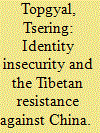

|
|
|
|
|
| Publication |
2013.
|
| Summary/Abstract |
This article re-examines the five-decade-old Tibetan struggle against Chinese rule, asking what drives this multifaceted resistance. It argues that identity insecurity has been at the heart of the Tibetan struggle, and takes a position against the problematic practice in both the academic literature and popular discourse of treating Chinese policies and practices as security-driven and the Tibetan struggle as motivated by ethno-nationalistic impulses. It charts the vigorous contestation within the Tibetan diaspora between those standing issue images_86_3_Topgyal_Tibet_03for complete independence and others who are satisfied with "greater autonomy" and examines the multifaceted resistance inside Tibet. It also recognizes the unifying effects of the widespread loyalty to the Dalai Lama and fears for the survival of the Tibetan identity. The article also examines the links between Tibet and its diaspora. All these themes are developed while demonstrating the security rationale behind the Tibetan struggle
|
|
|
|
|
|
|
|
|
|
|
|
|
|
|
|
| 4 |
ID:
128534
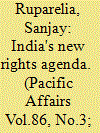

|
|
|
|
|
| Publication |
2013.
|
| Summary/Abstract |
Since 2004, India has introduced a series of progressive national bills that enact a right to new civic entitlements, ranging from information, work and education to forest conservation, food and basic public services. What explains the emergence of these laws? How are the rights conceived by these acts conceptualized, operationalized and pursued? What are the promises, challenges and risks-legal, political and economic-of enshrining socioeconomic entitlements as formal statutory rights? This paper engages these questions. In part 1, I argue that three slow-burning processes since the 1980s, distinct yet related, catalyzed India's new rights agenda: high socio-legal activism, rapid uneven development and the expanding popular foundations of its federal parliamentary democracy. Significantly, all three processes exposed the growing nexus between political corruption and socioeconomic inequality. Equally, however, each raised popular expectations for greater social justice that were only partly met. Part 2 of the paper evaluates India's new rights agenda. The promise of these new laws is threefold: they breach the traditional division of civil, political and socioeconomic rights, devise innovative governance mechanisms that enable citizens to see the state and provide fresh incentives for new political coalitions to emerge across state and society. Several risks exist, however. Official political resistance from above and below, the limited capacities of judicial actors, state bureaucracies and social forces and the relatively narrow base of many of these new movements endanger the potential of these reforms. The paper concludes by considering several imperatives that India's evolving rights movement must confront to realize its ambition.
|
|
|
|
|
|
|
|
|
|
|
|
|
|
|
|
| 5 |
ID:
128530


|
|
|
|
|
| Publication |
2013.
|
| Summary/Abstract |
This paper sheds light on a relatively unexplored component of Japan's security architecture: the national security secrecy system. Among the protection measures underpinning this system, particular attention is paid to the legal aspects. This system has been caught between two competing pressures. On the one hand, the United States and domestic conservative forces have consistently sought to strengthen what they consider to be an unsatisfactory system of safeguarding national security secrets in Japan. On the other, left-leaning political actors, the media and public opinion, informed by the norm of antimilitarism - understood as a deep distrust of Japan's military establishment and opposition to its foreign deployment, and also broadly predicated on fear of democratic retreat - have been able to thwart these attempts. As a result, Japan lacks a specific anti-espionage or state secrets law and has earned the reputation of a "spy heaven" where foreign agents, domestic collaborators and information leakers have been able to act with seeming impunity. However, rising bilateralism - under which Japan acts to consolidate alliance relations with its superpower patron - in the security and intelligence fields over the past decade and the subsequent pressures from the United States, a dissatisfied ally, facilitated by the rise of regional security threats and a shift in the domestic political terrain, have contributed to an incremental erosion of the antimilitaristic constraints on the legal component of Japan's security secrecy system. Japanese governments have moved to bolster the secrecy protection regime, although reforms are not as significant as what they would be absent residual antimilitarism.
|
|
|
|
|
|
|
|
|
|
|
|
|
|
|
|
| 6 |
ID:
128535
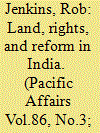

|
|
|
|
|
| Publication |
2013.
|
| Summary/Abstract |
India's legal regime governing the compulsory acquisition of private land by the state for "public purposes" - centered on the Land Acquisition Act 1894 (LAA) - has long been criticized for breeding corruption and insufficiently protecting landowners and local communities. Attempts to overhaul the LAA have faced stiff resistance from powerful interests within and outside the state. When the United Progressive Alliance government took power in 2004, few would have guessed that it would seek to replace the LAA with legislation that imposes more rigorous standards for the compulsory acquisition of land and detailed rules for rehabilitating displaced people. Yet, in 2011 the government introduced the Land Acquisition, Rehabilitation and Resettlement Bill (LARRB). This article argues (1) that the LARRB displays certain distinctive characteristics shared by other rights-related statutes enacted under the UPA government; (2) that the emergence of this distinctive - and unforeseen - piece of legislation was driven largely by India's approach to creating Special Economic Zones; and (3) that both the LARRB's content and the process by which it was introduced have implications for debates of wider theoretical significance, including the increasingly hybrid nature of rights, and the desirability of combining insights from the literatures on "policy feedback" and "policy entrepreneurs."
|
|
|
|
|
|
|
|
|
|
|
|
|
|
|
|
| 7 |
ID:
128532
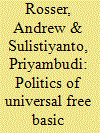

|
|
|
|
|
| Publication |
2013.
|
| Summary/Abstract |
Since the fall of Suharto's New Order, Indonesia's central government has substantially strengthened the legal and financial basis of universal free basic education (UFBE). Yet sub-national governments have varied considerably in their responses to the issue with some supporting UFBE and others not. Why has this happened? What are the implications for the future of UFBE in Indonesia? And what does Indonesia's sub-national experience tell us about the political preconditions for UFBE in developing countries? We try to shed some light on these questions by examining the politics of UFBE in Bantul and Sleman, two districts in the Special Region of Yogyakarta.
We argue (i) that these districts' different responses to UFBE have reflected the extent to which their bupati have pursued populist strategies for mobilising votes at election time and there has been resistance to UFBE from groups such as business, the middle classes, and teachers; (ii) that Indonesia's sub-national experience suggests that there is an alternative pathway to UFBE besides organisation of the poor by political entrepreneurs; and (iii) that the future of UFBE in Indonesia thus rests on the nature of bupatis' strategies for advancing their careers and the strength of local groups opposed to UFBE.
|
|
|
|
|
|
|
|
|
|
|
|
|
|
|
|
|
|
|
|
|